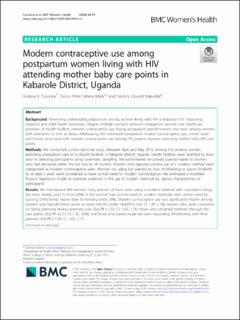Modern contraceptive use among postpartum women living with HIV attending mother baby care points in Kabarole District, Uganda
Journal article, Peer reviewed
Published version

Åpne
Permanent lenke
https://hdl.handle.net/11250/2764703Utgivelsesdato
2020-04-22Metadata
Vis full innførselSamlinger
Sammendrag
Background: Preventing unintended pregnancies among women living with HIV is important for improving maternal and child health outcomes. Despite multiple contacts between postpartum women and healthcare providers at health facilities, modern contraceptive use during postpartum period remains low even among women with intentions to limit or delay childbearing. We estimated postpartum modern contraceptive use, unmet need and factors associated with modern contraceptive use among HIV positive women attending mother-baby HIV care points.
Methods: We conducted a cross-sectional study, between April and May 2016, among HIV positive women attending postpartum care at six health facilities in Kabarole district, Uganda. Health facilities were stratified by level prior to selecting participants using systematic sampling. We administered structured questionnaires to women who had delivered within the last two to 18 months. Women who reported current use of a modern method were categorized as modern contraceptive users. Women not using but wanted to stop childbearing or space childbirth by at least 2 years were considered to have unmet need for modern contraception. We estimated a modified Poisson regression model to examine variations in the use of modern methods by various characteristics of participants.
Results: We interviewed 369 women. Forty percent of them were using a modern method, with injectables being the most widely used. A third (33%) of the women had unmet need for modern methods, with unmet need for spacing (24%) being higher than for limiting births (9%). Modern contraceptive use was significantly higher among women who had delivered seven or more months earlier (Adj.PR = 2.02; CI: 1.49, 2.74); women who were counseled on family planning during antenatal care (Adj.PR = 1.53; CI: 1.07, 2.18); those who obtained methods through the care points (Adj.PR =2.27; CI: 1.32, 3.90); and those who jointly made decisions regarding childbearing with their partners (Adj.PR = 1.49; CI: 1.02, 2.17).
Conclusion: Use of modern contraceptives was low while unmet need was high among postpartum women living with HIV. The findings suggest that there are gaps which indicate the need to strengthen contraceptive service delivery at these care-points. Providing family planning counseling early would improve uptake of contraception upon resumption of menses and sexual activity.
